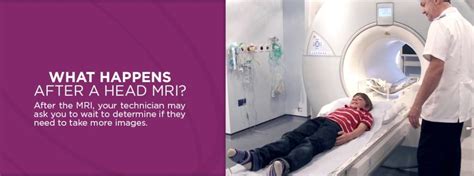Head Mri Test Prep: Know What To Expect

When it comes to preparing for a head MRI test, it’s essential to understand what the procedure entails and how to make the most out of your experience. A head MRI, or Magnetic Resonance Imaging, is a non-invasive diagnostic test that uses magnetic fields and radio waves to produce detailed images of the brain and its surrounding tissues. In this comprehensive guide, we’ll walk you through the preparation process, what to expect during the test, and provide valuable tips to help you feel more comfortable and informed.
Understanding the Purpose of a Head MRI
Before diving into the preparation process, it’s crucial to understand why your doctor has recommended a head MRI. This test is commonly used to diagnose and monitor various conditions affecting the brain, such as:
- Tumors: Both cancerous and non-cancerous growths can be detected using MRI technology.
- Stroke and Vascular Diseases: MRI helps identify areas of the brain affected by stroke or other vascular conditions.
- Injuries: Traumatic brain injuries, including concussions, can be assessed with an MRI.
- Neurological Disorders: Conditions like multiple sclerosis, Alzheimer’s disease, and Parkinson’s disease can be monitored and diagnosed using MRI scans.
- Infections and Inflammations: MRI is useful in identifying infections such as meningitis or encephalitis and inflammatory conditions like abscesses.
Preparing for Your Head MRI
Proper preparation is key to ensuring that your head MRI test is successful and that you get the most accurate results. Here are some steps you can take to prepare:
1. Follow Your Doctor’s Instructions
Your doctor may provide specific instructions regarding food, drink, and medication before the test. It’s essential to follow these instructions carefully to avoid any complications or the need for a repeat scan.
2. Remove Metallic Objects
Inform your doctor about any metal implants, such as pacemakers, artificial joints, or surgical clips, as these can interfere with the MRI machine. You’ll also need to remove any metallic objects like jewelry, hairpins, or clothing with metal parts before the test.
3. Wear Comfortable Clothing
Choose loose, comfortable clothing without metal fasteners. You may be asked to change into a gown to ensure safety and comfort during the procedure.
4. Avoid Claustrophobia Triggers
If you’re claustrophobic, inform your doctor or the MRI technician. They can provide guidance or sedation to help you feel more comfortable during the test.
What to Expect During the Head MRI
Now that you’re prepared, let’s go through what you can expect during the actual test:
1. Arrival and Preparation
Upon arrival, you’ll be asked to fill out a safety questionnaire to ensure it’s safe for you to undergo an MRI. You’ll then be escorted to the MRI suite, where you’ll be asked to remove any remaining metal objects and change into a gown if necessary.
2. The MRI Machine
The MRI machine is a large, cylindrical device with a table that slides in and out of it. You’ll lie down on the table, and your head will be positioned in a special coil or frame to ensure clear images of your brain.
3. The Scanning Process
Once you’re in position, the table will slide into the MRI machine. You’ll hear loud knocking or beeping sounds during the scan, which is completely normal. The machine will take several images of your brain from different angles, and you’ll need to remain still to ensure clear images.
4. Contrast Material (Optional)
In some cases, a contrast material (usually gadolinium) may be injected into a vein in your arm to highlight certain areas of the brain during the scan. This is a common practice and usually doesn’t cause any discomfort.
After the Test
After the scanning process is complete, the technician will help you off the table, and you can change back into your clothes. The entire process typically takes between 30 minutes to an hour, though this can vary depending on the type of scan and the number of images needed.
Results
Your MRI scans will be reviewed by a radiologist, who will then send a report to your doctor. Your doctor will discuss the results with you, explaining what the images show and the next steps in your diagnosis or treatment plan.
Tips for a Smooth Experience
To make your head MRI experience as smooth as possible, consider the following tips:
- Stay Relaxed: Deep breathing exercises or meditation can help you relax during the scan.
- Listen to Music: Many MRI machines offer the option to listen to music during the scan, which can help distract you from the noise.
- Bring a Friend or Family Member: Having someone with you during the test can provide emotional support and help you feel less anxious.
- Ask Questions: If you have any concerns or questions, don’t hesitate to ask your doctor or the MRI technician.
Conclusion
A head MRI test is a powerful diagnostic tool that can provide valuable insights into your brain health. By understanding what to expect and how to prepare, you can feel more at ease and ensure that you get the most out of your test. Remember, communication is key, so never hesitate to ask questions or express any concerns you may have.
Frequently Asked Questions
What is the difference between an MRI and a CT scan?
+MRI scans use magnetic fields and radio waves to produce images, whereas CT scans use X-rays. MRI is better for detailed images of soft tissues, like the brain, while CT scans are often used for bones and other structures.
Is it safe to have an MRI if I'm pregnant?
+Generally, MRI scans are considered safe during pregnancy, especially after the first trimester. However, it's crucial to discuss your situation with your doctor to determine the best approach for your specific condition.
Will I feel any pain during the MRI scan?
+The MRI scan itself is painless. You might feel some discomfort from lying still for a long time or from the noise of the machine, but this can be managed with relaxation techniques or listening to music.
How long does it take to get the results of an MRI scan?
+The time it takes to get the results can vary. Typically, your doctor will receive the report within a day or two, but it may take longer depending on the complexity of the scan and the radiologist's schedule.
Can I drive after having an MRI scan?
+Yes, you can drive after an MRI scan unless you've been given a sedative. If you've received sedation, you'll need someone to drive you home and stay with you for a few hours until the effects wear off.
By being informed and prepared, you can navigate the head MRI process with confidence, taking the first steps towards understanding and addressing your health concerns. Remember, your health is a journey, and staying informed is the first step towards a healthier, happier you.


